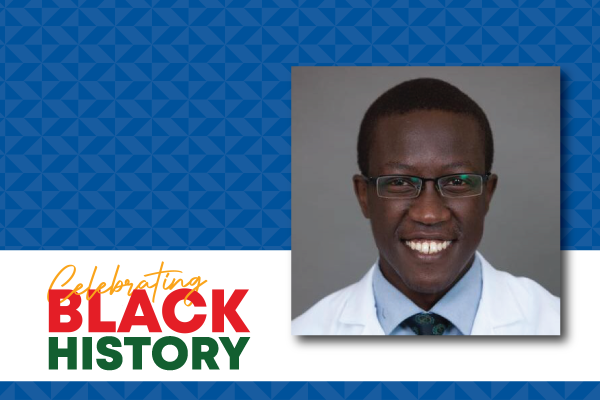
Dr. Titus Ngeno is an assistant professor in the division of Cardiology and Duke Global Health Institute. Born and raised in Kenya, he trained in medicine at the University Nairobi then as a medical officer at Moi Teaching and Referral Hospital (MTRH) in Eldoret, Kenya, where he became known to several Duke faculty members as an outstanding clinician with notable leadership qualities.
Dr. Ngeno is a graduate of the Master of Science in Global Health program at Duke and, recently completing the global health pathway a second time as a cardiovascular disease global health fellow. He completed his training in 2017, choosing to pursue cardiology and global health as a specialist because the unique combination allowed him to spend time caring for patients at the bedside while working to improve access to health care.
“I’m passionate about global cardiovascular disease because it is the leading cause of morbidity and mortality around the world, and it represents one of the greatest health risks to my generation and that of our children,” he said.
Dr. Ngeno’s research is focused on innovative cardiovascular disease interventions to improve health outcomes among patients with cardiovascular diseases domestically in Durham, and abroad in Africa, where he provides clinical care to patients and teaches cardiology trainees. He also conducts research to inform implementation of tech-enabled interventions such as remote monitoring for cardiac rehabilitation.
Dr. Ngeno was a lead investigator in an NIH-funded feasibility study on cardiac rehabilitation in Kenya, and subsequently conducted the Cardiac RehabilitatiOn and Metabolomic Profile among Patients with Heart Failure (CROMe-HF) clinical trial.
These studies found that cardiac rehabilitation is both feasible and makes a significant difference in improving functional capacity and well-being of patients. He also identified barriers to access, such as patients needing to travel long travel distances to access very few specialists, barriers that could be overcome by leveraging expanding telecommunication platforms and digital health tools.
Since 2010, Dr. Ngeno, together with Duke cardiology faculty members, Drs. John Lawrence and Gerald Bloomfield, have supported the growth of a cardiology program at MTRH. The Duke-MTRH partnership has led to the establishment of a cardiac ICU, growth of diagnostic and ambulatory cardiology services, and development of a cardiology fellowship training program.
Through a collaborative effort between the Duke division of Cardiology, the Hubert-Yeargan Center for Global Health and the Duke Global Health Institute, Dr. Ngeno continues to co-lead cardiovascular development in the region.
Dr. Ngeno in the following short interview shares more about how his innovative research and work helps our communities and moves medicine forward.
Q: How does your work improve health outcomes in our communities?
Dr. Ngeno: Despite significant global advances in diagnostic and therapeutic services, access to care remains a key barrier to improving the livelihoods of the communities we live in. There is inadequate infrastructure and human resources to fill the gap in care needs. With colleagues in the global health arena, we strive to bridge the gap through building the workforce, and conducting research on novel care delivery models, especially in underserved regions where early prevention and treatment of diseases such as hypertension and heart failure is critically needed.
Q: How does your work move medicine forward?
Dr. Ngeno: Since 2010, I have been closely involved in the establishment and growth of cardiovascular care services in Kenya. In partnership with faculty at the MTRH, my colleagues and I have developed clinical, teaching and research capacity including establishment of a cardiac intensive care unit, growth of diagnostic imaging services, and development of a cardiology fellowship training program.
Q: What is innovative about your work?
Dr. Ngeno: In the age of AI powered digital technologies, integration and scaling up of tech enabled health services has the potential to leapfrog health care access barriers, and to re-define health systems. Tech enabled health solutions in low-resource settings hold promise for transforming communities by scaling access to care at much lower cost, especially when applied towards prevention and early disease treatment.